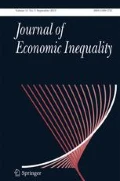Abstract
Data from Mexico are used to examine whether two indicators of subjective well-being—income satisfaction and income adequacy—correlate not only with the respondent’s absolute level of income, but also with their assessment of how their income compares relative to the income of a reference group, the level of income they hoped to have achieved by that stage of their life, and the income they had three years earlier. Both subjective well-being indicators correlate positively with the ranking relative to all three reference points. Some of the findings differ across segments of the income distribution. Subjective well-being assessments of the poor are influenced more by the inability to achieve income aspirations, while differences with respect to others is a more prominent factor among non-poor respondents.
Similar content being viewed by others
References
Arranz, J.M., Canto, O.: Measuring the effect of spell recurrence on poverty dynamics: evidence from Spain. J. Econ. Inequal. (2011). doi:10.1007/s10888-011-9191-2
Blanchflower, D.G., Oswald, A.J.: Well-being over time in Britain and the USA. J. Public Econ. 88(7–8), 1359–86 (2004)
Bossert, W., Chakravarty, S.R., D’Ambrosio, C.: Poverty and time. J. Econ. Inequal. (2011). doi:10.1007/s10888-011-9175-2
Carlsson, F., Johansson-Stenman, O., Martinsson, P.: Do you enjoy having more than others? survey evidence of positional goods. Economica 74, 586–98 (2007)
Carlsson, F., Gupta, G., Johansson-Stenman, O.: Keeping up with the Vaishyas? caste and relative standing in India. Oxf. Econ. Papers 61, 52–73 (2009)
Clark, A., Frijters, P., Shields, M.: Relative income, happiness and utility: an explanation for the Easterlin Paradox and other puzzles. J. Econ. Lit. 46, 95–144 (2008)
Clark, A., Oswald, A.: Satisfaction and comparison income. J. Public Econ. 61, 359–81 (1996)
Clark, A., Senik, C.: Who compares to whom? the anatomy of income comparisons in Europe. Econ. J. 120, 573–594 (2010)
CONEVAL.: Aplicacion de la Metodologia del Comité Tecnico para la Medicion de la Pobreza en Mexico 2000–2005. Nota Tecnica 01/2006 (2006)
Easterlin, R.A.: Income and happiness: towards a unified theory. Econ. J. 111(473), 465–484 (2001)
Easterlin, R.A.: Explaining happiness. Proc. Natl. Acad. Sci. 100(19), 11176–11183 (2003)
Easterlin, R.A.: A puzzle for adaptive theory. J. Econ. Behav. Organ. 56(4), 513–521 (2005)
Falk, A., Knell, M.: Choosing the Joneses: endogenous goals and reference standards. Scand. J. Econ. 106, 417–35 (2004)
Festinger, L.: A theory of social comparison processes. Hum. Relat. 7, 117–140 (1954)
Ferrer-i-Carbonell, A., Frijters, P.: How important is methodology for the estimates of the determinants of happiness? Econ. J. 114, 641–659 (2004)
Ferrer-i-Carbonell, A.: Income and well-being: an empirical analysis of the comparison income effect. J. Public Econ. 89(2005), 997–1019 (2005)
Gastorf, J., Suls, J.: Performance evaluation via social comparison: performance similarity versus related-attribute similarity. J. Soc. Psychol. 41(4), 297–305 (1978)
Gandhi, G., Knight, J.: Subjective well-being poverty vs. income poverty and capabilities poverty? J. Dev. Stud. 42(7), 1199–1224 (2006)
Hoy, M., Thombson, B., Zheng, B.: Empirical issues in lifetime poverty measurement. J. Econ. Inequal. (2011). doi:10.1007/s10888-011-9192-1
Johansson-Stenman, O., Martinsson, P.: Honestly, why are you driving a BMW? J. Econ. Behav. Organ. 60, 129–46 (2006)
Kahneman, D., Tversky, A.: Advances in prospect theory. J. Risk Uncertainty 5, 297–323 (1992)
Kahneman, D., Krueger, A.: Developments in the measurement of subjective well-being. J. Econ. Perspect. 20(1), 3–24 (2006)
Koszegi, B., Rabin, M.: A model of reference-dependent preferences. Q. J. Econ. CXXI(4), 1133–1165 (2006)
Lokshin, M, Umapathi, N., Paternostro, S.: Robustness of subjective welfare analysis in a poor developing country: Madagascar 2001. J. Dev. Stud. 42(4), 559–591 (2006)
Ravallion, M., Lokshin, M.: Who cares about relative deprivation? J. Econ. Behav. Organ. 73, 171–185 (2010)
Rojas, M.: Experienced poverty and income poverty in Mexico: A subjective well-being approach. World Dev. 36(6), 1078–1093 (2008)
Solnick, S.J., Hemenway, D.: Is more always better? A survey about positional concerns. J. Econ. Behav. Organ. 37(3), 373–83 (1998)
Solnick, S., Hemenway, D.: Are positional concerns stronger in some domains than in others? Am. Econ. Rev., Papers Proc. 45, 147–51 (2005)
Stutzer, A.: The role of income aspirations in individual happiness. J. Econ. Behav. Organ. 54, 89–109 (2004)
Van Praag, B., Flik, R.J.: Subjective poverty line definitions. De Economist 139(3), 311–330 (1991)
World Development indicators database. World Bank
Author information
Authors and Affiliations
Corresponding author
Rights and permissions
About this article
Cite this article
Castilla, C. Subjective well-being and reference-dependence: Insights from Mexico. J Econ Inequal 10, 219–238 (2012). https://doi.org/10.1007/s10888-012-9222-7
Received:
Accepted:
Published:
Issue Date:
DOI: https://doi.org/10.1007/s10888-012-9222-7




